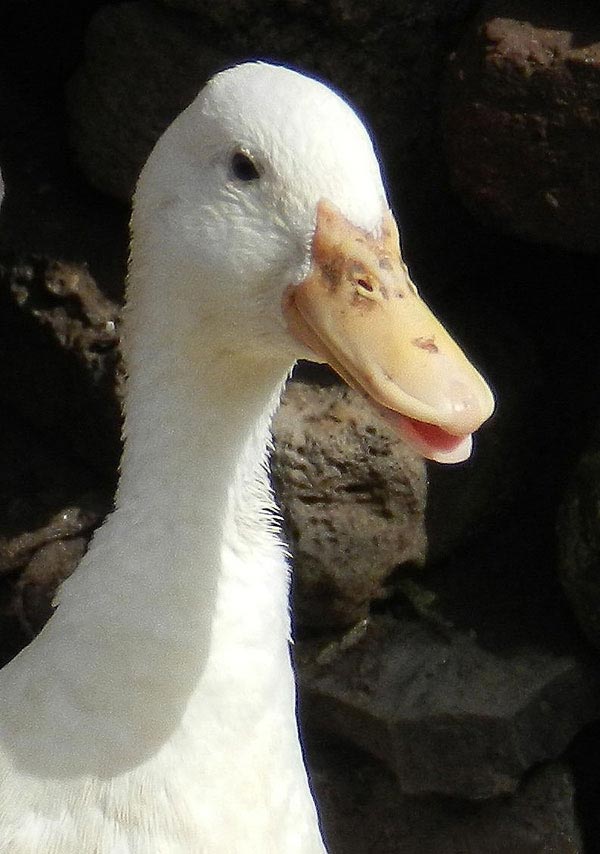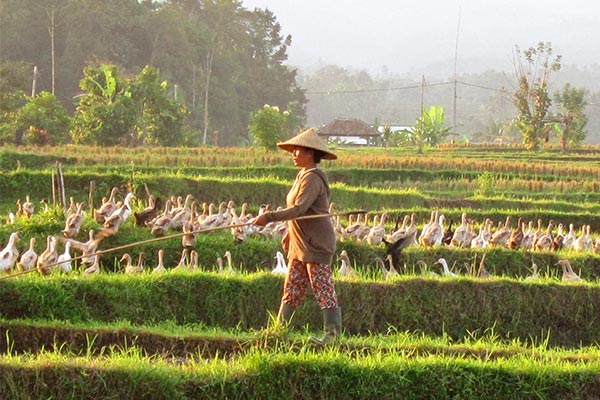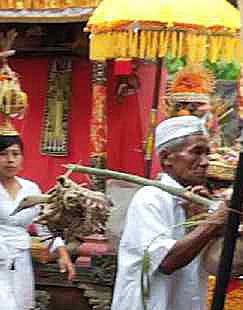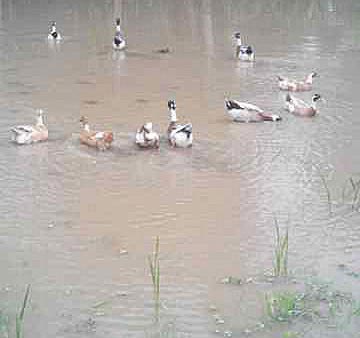Duck Wisdom
 Stories of rural Bali by Sang Tu, advisor for Balinese culture and herbal medicines
Stories of rural Bali by Sang Tu, advisor for Balinese culture and herbal medicines
If we spend long enough time out in nature, there is lots to learn, either from the animals, from the trees, from the insects and so on. Their language is not spoken or written but if we watch, it is telling us something. We like to watch nature at Bali silent Retreat including ‘the way of ducks’.
Ducks have their way of being ducks; a duck philosophy.

Ducks have a feast in the rice fields after harvest. Yummy food and run round time for the ducks. Free duck food for the duck farmer. Good duck fertilizer for the soil.
Duck Directions: You can see the old man or woman takes the ducks into all the rice fields. He puts the stick to the right and all the ducks go left. He puts the stick to the left and all the duck go right. This is the way of ducks.
Duck Girls and Boys: I asked the duck farmer about his ducks and how he knows the difference between the female ducks and the make ducks. He told me the females talk more – ha! . . . . . . . I laughed for a long time.
Duck Fashion and Cleanliness: The rice field is a mud field with everything dirty and filled with weeds and debris. But this is the best place for the best food for ducks. They care less than less about getting dirty. Yet their feathers don’t get dirty.
 This is the way of ducks. We cannot change it. I think the old Balinese farmer likes this about his ducks. Maybe this is duck wisdom for humans.
This is the way of ducks. We cannot change it. I think the old Balinese farmer likes this about his ducks. Maybe this is duck wisdom for humans.
Balinese use ducks for not just eggs and meat but according to the Balinese priest books of rituals (Lontar Kala Tatwa and Lontar Sudamala) ducks are very useful for ceremonies. Since we have abundant ceremonies in our culture, we have many styles and colors of ducks to make a good variety.
Ducks by age:
memeri = the baby duck
memeri bulu jaum = when it gets older and the wings start getting feathers
meri kebah = the duck with full feathers
bebek = a duck that lays eggs
Ducks for ceremony are determined by color of feather, style of feather, and foot :
bebek belang kalung = duck with 4 colors for 4 directions: black (north), white (east), red (south), yellow (west). It has white feathers on its neck like a necklace and has yellow legs. This duck is use it for a special temple ceremony every 5 years. It can also be used in a Harmony ceremony.
bebek putih jambul = duck with white feathers, yellow mouth and yellow butt, and has feather top knot its head. This duck is used for many many ceremonies; at Nyepi (silent day), temple ceremonies, ceremonies in the family compound . . . pretty much any time. It’s also used when a Balinese becomes a priest (mangku) because the duck is the animal symbol of wisdom and the white represents holiness, which the priest is supposed be. The high priest (peranda) touches the head of the candidate with the topknot on the head of the white duck, as a symbol to be wise and holy.
bebek selem (black duck) = can be used solar eclipse, civil war, epidemic disease, or can be exchanged for buffalo sacrifice, when funds are low .
Feeding baby ducks – old style
There’s no duck food in Bali and the Balinese would think this is a waste of money and generally a stupid concept. I remember my father would make a special place to grow insects and worms to produce baby duck food, long before we even got our baby ducks. He wanted to make sure they would have plenty to eat, grow fast and be healthy over the 3 months it takes to raise them to adults, when they can find their own food in the rice paddy. He would find old logs in the river and fill them up with grass and cow poop, so lots of insects would make their home. Then he’d mix in weeds called biyah biyahis (similar to water hyacinth), so the babies had greens to eat too.
I am sad now that this plant is getting less in the rice fields, because the eel and dragon fly are get getting less and less also. Most Balinese farmers using herbicides and fertilizers which pollutes our food and water even more. Here at Bali Silent Retreat we are still using compost in olden ways to take care of our soil and all nature’s gifts.




